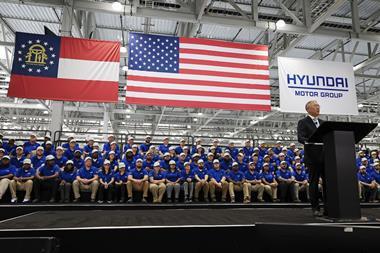 Wayne State University in Michigan has set up a non-degree certificate programme in partnership with the Automotive Industry Action Group (AIAG). The course is designed to provide students with an understanding of current supply chain topics, with a specific focus on the automotive industry.
Wayne State University in Michigan has set up a non-degree certificate programme in partnership with the Automotive Industry Action Group (AIAG). The course is designed to provide students with an understanding of current supply chain topics, with a specific focus on the automotive industry.
Participants will cover a wide range of topics including supply chain management strategy, financing, forecasting, negotiations, procurement strategy, and supplier development. The programme will also address risk management, production operations, quality management processes and Six Sigma, trade management, as well as logistics and transport management. Sessions will begin on February 6, 2014, and will be offered over 24 weekly sessions with a three-month summer break beginning in June during which students will also be working on projects to put the skills gained through the course into practice.
“This programme is targeted at high-potential staff who may or may not have had formal SCM (supply chain management) training in school,” said John Taylor, director of supply chain programmes at Wayne State’s School of Business Administration. “It covers many of the big issues they face in their current jobs and that they will face as they continue to advance in their careers.”
Taylor told Automotive Logistics that Wayne State’s location in southeast Michigan made it the ideal premier programme and detailed some of the modules included on the course, which will be taught by both industry professionals and academics involved in research at the faculty.
“We have specific 3.5 hour modules on warehousing and sequencing centres and also on outbound finished vehicle logistics,” he said. “AIAG is the top vehicle Industry SCM training organisation in North America and this partnership gives us access to their industry experts to pair in classroom with our SCM academic faculty.”
Supply chain challenges
Asked what he saw as the principal challenges to be addressed by the course in the automotive supply chain at this time of regrowth in North America, Taylor said they involved finding the capacity to achieve high volumes and doing so with high quality levels.
He said there were also issues around dealing with increasing customer options, being able to build relationships with suppliers to achieve product innovation and moving the industry to a low enterprise cost-sourcing strategy that could move the supply base in closer to assembly plants or not.
Other issues to be addressed included achieving visibility of the entire supply base through multiple tiers, being able to reduce the carbon footprint while maintaining speed and reliability and dealing with increasingly complex customs and security issues in global sourcing.
Taylor said the industry need to look at how to cut broad logistics costs by 10-15%, including warehousing, inventory carrying costs and transportation, while not impacting speed and reliability. “[Also] determining appropriate inventory levels given the above objectives, which may mean more or less inventory and addressing risk management issues,” added Taylor.
AIAG has promoted the collaborative efforts of OEMs, suppliers, service providers and government entities for more than 30 years: course sessions will also be held at its headquarters in Southfield, Michigan. There are currently over 960 members of AIAG, including OEMs, parts suppliers and service providers.
J.Scot Sharland, AIAG’s executive director, said: “What makes this programme so effective is the significant input from automotive supply chain management veterans who will not only contribute their experience and expertise, but also will provide participants with the absolute latest in trends, developments and best practices in global supply chain management. We're excited about the opportunity to partner with Wayne State University and are confident that, together, we can help accelerate the development of a new generation of supply chain professionals.”

























![Global[1]](https://d3n5uof8vony13.cloudfront.net/Pictures/web/a/d/s/global1_726550.svgz)










